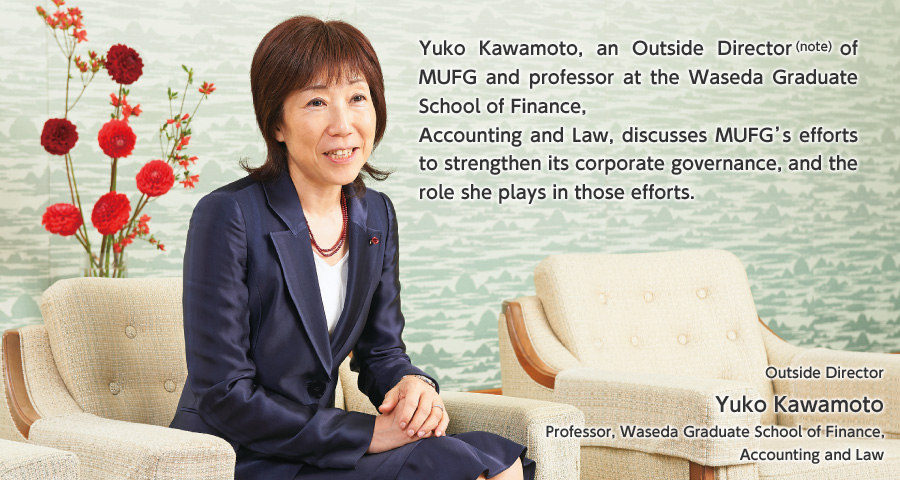Interview with Outside Director

Career Summary
Ms. Kawamoto holds a BA degree in Social Psychology from the University of Tokyo and a Master’s of Science degree in Development Economics from the University of Oxford (St. John’s College). After working at the Bank of Tokyo, she joined the Tokyo office of McKinsey and Company in 1988, and was based in Paris from 1995 to 1999. She took up a professorship at the Waseda Graduate School of Finance, Accounting and Law in 2004. Ms. Kawamoto has served as an outside director of the Mitsubishi UFJ Financial Group since June 2013.
(note) Having previously been an employee of the Bank of Tokyo (the present Bank of Tokyo-Mitsubishi UFJ), Ms. Kawamoto does not meet the requirements of an outside director stipulated in the Companies Act, but in light of the fact that more than 25 years have elapsed since her retirement from the Bank of Tokyo and given her wealth of experience as a management consultant and university professor, the Company considers her to be sufficiently independent to serve as an independent director. With the revision of the Companies Act, Ms. Kawamoto will meet the requirements of an outside director from the conclusion of the Annual General Meeting of Shareholders to be held in June 2016.
What is your opinion of MUFG’s efforts to strengthen its corporate governance?
I take a positive view of the various changes being made to make management more open, both outside the Company and outside Japan. Nevertheless, we cannot rest on our laurels. I believe that reforming corporate governance requires constant effort.
The success or failure of corporate governance in Japan holds the key to whether Japan will resume its place as a key component of the global economy, and there is currently a great deal of interest in this issue worldwide. At the same time, there are numerous issues that need to be overcome, including the inconsistent separation of execution and oversight, the weakness of boards of directors’ oversight function, the risk from a lack of diversity within companies, and insufficient transparency in personnel decision making.
Over the past two years, through the leadership of top management and the diligent work of staff, MUFG has been a leader in reforming corporate governance at Japan’s megabanks. A variety of changes have been implemented that make management more open outside the Company and outside Japan.
The Board of Directors is pursuing structural reforms like increasing the number of independent directors. There have been major changes, not only regarding the selection of members, but also in terms of operations, including reviews of proposals to promote effective discussion. I feel that both the quantity and quality of discussion have increased significantly compared with two years ago, when I assumed office as an Independent Director.
In addition to the previously existing Nomination and Compensation Committee and Internal Audit and Compliance Committee, the Board has effectively broadened the scope of discussion by establishing a new Governance Committee and Risk Committee. The Board has also clarified its corporate governance policy. Along with striving to maintain diversity through initiatives including the appointment of more than one female director, I expect that the change of our corporate governance structure in 2015 will strengthen the oversight function.
MUFG’s global presence is growing. I feel that as a financial institution subject to special regulations, including those of overseas regulatory agencies, management cannot forget for a moment that there is a great deal of interest internationally in MUFG’s corporate governance.
This is why we cannot rest on our laurels. We need to make constant efforts to reform corporate governance going forward, based on the three strategic focuses of “Customer perspective,” “Group-driven approach,” and “Productivity improvements” laid out in the medium-term business plan.
What role can you play as an independent director toward achieving MUFG’s vision of being “the world’s most trusted financial group”?
I would like my role to be one of a “supporter of reform,” using my position of being independent from operational execution to provide direct input through dialogue with management including the Board of Directors.
I would like to be a “supporter of reform.”
Management strives to maximize corporate value while maintaining a balance among the Company’s stakeholders including shareholders, customers, employees, and local communities. In terms of maintaining this balance, I feel that, in fact, it is very difficult to “make correct decisions.”
I believe independent directors play an important role in examining and determining whether the Board’s management policies have this balance. Within a company, people can become overly cautious and as a result discussion of certain subjects can become taboo. To ensure that this does not happen, independent directors can make executionside managers aware of the situation by asking questions based on “common-sense intuition.” If this process works properly, I believe the Board of Directors is more likely to be able to make good decisions that are truly balanced, and that will lead to the maximization of corporate value. Having a Board of Directors that is not biased in its decision making is in itself a foundation from which to gain trust.
To become “the world’s most trusted,” MUFG needs to be sensitive to changes in both the Japanese economy and the global economy, and be flexible in its response to those changes, to achieve the position it wants to attain as social infrastructure and as an economic engine.
The fact that independent directors are separated from operational execution is the reason they are able to contribute to management. By extending our “outside antennae,” we can be sensitive to the expectations of investors and the needs of customers, and I hope to be able to enhance discussion by providing direct input through dialog with the Board of Directors and other senior managers. I am confident that this will ultimately lead to the enhancement of corporate value.
